Weight Watching
Severely obese middle-aged people are reportedly “50% more likely to die early”, so maintaining a healthy weight is crucial to reducing our chances of an early exit. Obesity has been linked to a high risk of premature death and serious illness. Those who fall into this unhealthy weight category are at “12 times the risk of type 2 diabetes, 22 times the risk of sleep apnoea and nearly 4 times the risk of heart failure.”[1]
You can find out your Body Mass Index (BMI) by using the NHS BMI calculator - www.nhs.uk/live-well/healthy-weight/bmi-calculator
Once you have your BMI measurement, you may want to have a chat with your GP about your weight and overall health in general.
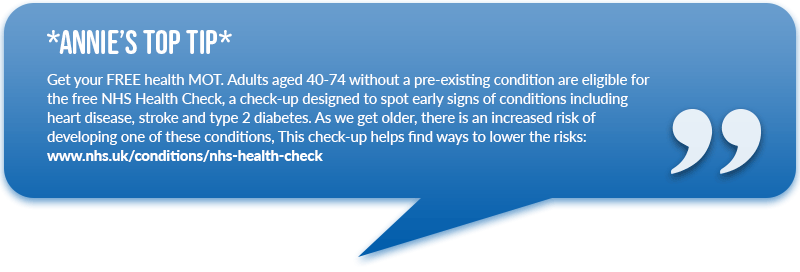
Walk the Walk
We all know that walking and running are two free and easy ways to increase the heart rate, get the blood pumping and burn some calories. However, if a wander along the same old route you’ve trodden for years no longer appeals, why not shake things up with one of these alternatives:
Combine a stroll with a sport like football or basketball – visit walkingfootballunited.co.uk or walkingbasketballuk.com for further info.
Make it to the Finnish line and try some Nordic Walking. Hold ski-like poles and move your arms in time with each stride for a full-body workout that’s still easy on the joints and the heart.
[1] https://www.nhs.uk/news/lifestyle-and-exercise/sit-less-move-more-may-be-key-advice-living-longer/
- Go hunting for hidden treasure. Use GPS or a geocaching app on your smartphone to seek out secret containers stashed all over the world. It’s a great way to explore and get moving. Don’t forget to bring along a pen and a piece of your own treasure to add along with a log of the time and date you found that spot!
Remember the more intensive the activity, the higher the benefits. According to the NHS, researchers re-examined data which included 36,383 people over 40 and found benefits were greatest for those who managed those 375 minutes a day of light-intensity exercise. However, just 24 minutes of moderate to vigorous physical activity is said to reduce the risk.[3]
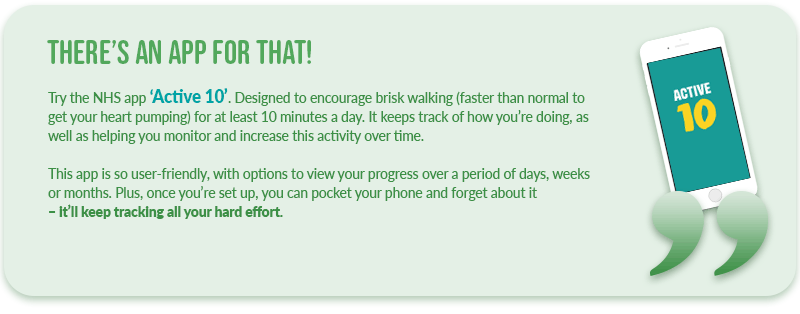
Eating Right
Combining regular exercise with a healthy diet is the best way of maintaining a healthy weight - obvious, right? But while obvious, it’s not always easy to take action. Fad diets are ten-a-penny (but are often far more costly) and can ultimately be ineffective. Busy lives, ready meals and ever more available delivery options mean it’s now all too easy to forget our health and our bank balance in favour of a quick fix.
Research shows that poor diets are now killing more people than smoking. A study by The Lancet medical journal in 2017 found that unhealthy eating habits are responsible for around 11 million deaths a year. Researchers say heart attack and stroke are the two main diet-related causes of death, followed by cancer and type 2 diabetes. We are not only affecting our weight when we reach for the junk food - we are impacting our overall health and longevity.
But simple changes can be the most effective…
The NHS recommends a balanced, low-fat and high-fibre diet which should include:
• plenty of fresh fruit and vegetables (say it with us - Five A Day!)
• lean proteins such as chicken, fish and eggs
• plenty of pulses and whole grains
Avoiding foods high in saturated fat, sugar and salt, along with our 6-8 recommended glasses of water a day, all help reduce our risk of an early death. But again, sometimes this is easier said than done.

[3] https://www.nhs.uk/news/lifestyle-and-exercise/sit-less-move-more-may-be-key-advice-living-longer/
[4] https://www.nhs.uk/news/food-and-diet/poor-diet-now-killing-more-smoking/
[5] https://www.nhs.uk/live-well/healthy-body/
On average, women should have around 2000 calories a day and men should have around 2500 calories a day.[1] However, most adults consume more calories than they need.
The NHS Eatwell Guide gives helpful, easy-to-understand information on how much from each food group we should eat as part of a healthy, balanced diet:
www.nhs.uk/live-well/eat-well/the-eatwell-guide
(Public Health England has a more detailed breakdown of this guide available on the same page.)
Alternatively, you can try including more of the Mediterranean diet in your weekly mealtimes. The same study in The Lancet found that most countries whose diet featured more fruit, vegetable, nuts and healthy oils (such as olive oil or brain-boosting Omega-3 found in some fatty fish like salmon mackerel or trout) see “the lowest number of [diet-related] deaths”[7].
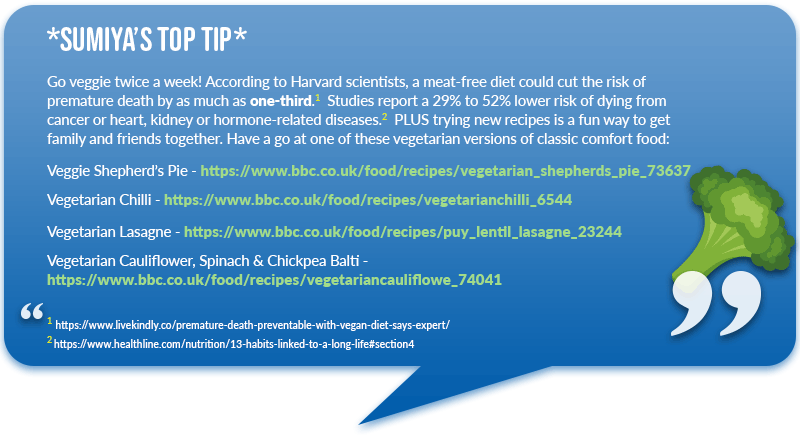
[6] https://www.nhs.uk/live-well/eat-well/cut-down-on-your-calories/
[7] https://www.thelancet.com/article/S0140-6736(19)30041-8/fulltext
[8] https://www.livekindly.co/premature-death-preventable-with-vegan-diet-says-expert/
[9] https://www.healthline.com/nutrition/13-habits-linked-to-a-long-life#section4
SLEEP
The NHS says that less than 6 hours of sleep a night is linked to a dramatic increase in risk of early death. Research claims that this lack of rest “could double - or even triple - your risk of dying from heart disease or cancer”.[10]
But getting the sleep you need isn’t always as simple as counting sheep, and for some of us, a full six hours might not seem possible. Here we’ve put together some advice we hope will help ease your nightly stresses.
Routine is Key
Maintaining a regular sleeping schedule is incredibly important for those of us who have difficulty drifting off. Most adults need between 6-9 hours of sleep each night, and the NHS recommends keeping regular sleeping hours to help program the brain and body clock.
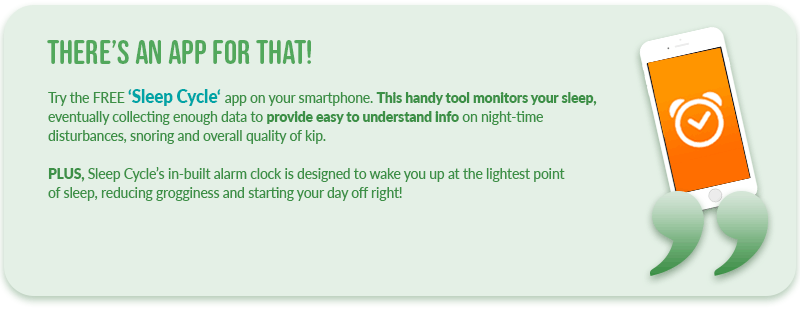
Wind It Down
Prepare yourself for a good night’s rest by trying out one of the following:
- Take a warm bath - this helps your body reach a temperature ideal for sleep. For a little added indulgence, use soothing scents like lavender, vanilla and chamomile to help you surrender to slumber.
- Make to-do lists - organise your thoughts and clear your mind of the day’s distractions before bed.
- Use yoga or light relaxation exercises to help relax the muscles - add in some meditation to relax the mind too
- Try the NHS Apps Library (www.nhs.uk/apps-library) or choose from countless podcasts designed to help you drift off.

CHANGING BAD HABITS
Ditch Those Cigarettes
“Overall, people who smoke may lose up to 10 years of life and be 3 times more likely to die prematurely than those who never pick up a cigarette.”
While the stats don’t lie, it’s never too late to make changes. One study showed that quitting smoking by age 35 could prolong life by up to 8.5 years. Quitting in your 60s could potentially add almost 4 years.[11]
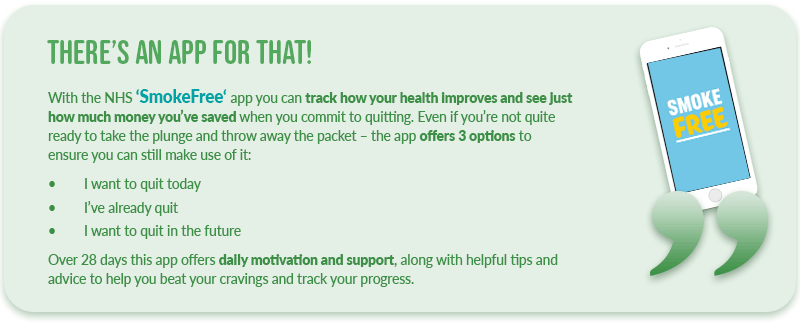
Nicotine replacement therapy (NRT) can double your chances of success. With low levels of nicotine, many brands offer lozenges and tablets, as well as inhalers and e-cigarettes. According to the NHS, e-cigarettes in this country are tightly regulated for safety and quality. They’re not completely risk-free, but they carry a small fraction of the danger of cigarettes.[12] All of these are useful ways of tricking your brain by keeping your mouth and hands busy and your mind off that craving.
Though the habit can be hard to break, research shows you’re up to 4 times more likely to successfully give up smoking if you use NHS support together with stop-smoking medicines, such as patches or gum.[13]

The NHS also offers daily email support and expert help if you’d like to speak with someone in person. There are also Facebook groups providing support and solidarity from others trying to break the habit. Or create a ‘Personal Quit Plan’ tailored to you: https://www.nhs.uk/oneyou/for-your-body/quit-smoking/personal-quit-plan/
If you prefer to chat to someone over the phone, why not try one of the several NHS-approved numbers available across the UK?
How to contact a Stop Smoking Adviser -

But what can you expect when you quit? Most smokers know that at first there is some irritability and frustration – you might even feel restless or more tired than usual. These symptoms will pass as your body starts to recover.[14] Here are some of the things that happen once you put down that last cigarette[15]:
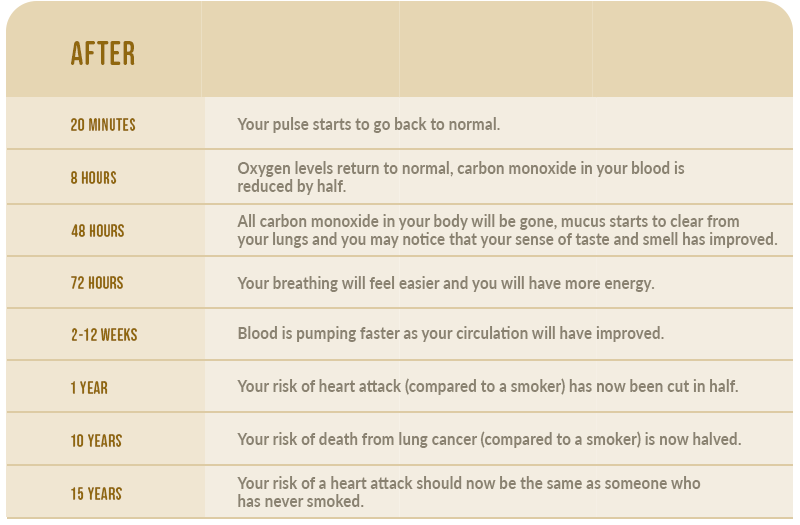
Cut Down on the Booze
Heavy alcohol consumption can cause real long-term damage to our liver and kidneys and is linked to an overall increased risk of early death.
Again, moderation is key. In fact, moderate amounts of alcohol, including red wine has been shown to increase levels of good cholesterol in the blood. It has also been found to lower the risk of heart disease. [16]
If you do drink, don’t exceed the maximum recommended limits. Men and women are advised not to regularly drink more than 14 units a week.
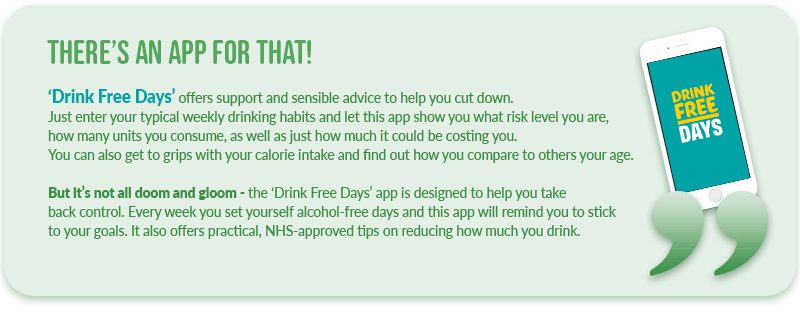
Always avoid binge drinking - this can increase your risk of a heart attack[17]. Instead, if you plan on having all 14 units, try spreading your drinking over three or more days. Next time you’re in the pub, try alternating alcoholic drinks with water to stay hydrated. Spare your head the next day, and your bank balance too!
[11] https://www.healthline.com/nutrition/13-habits-linked-to-a-long-life#section1
[12] https://www.nhs.uk/live-well/quit-smoking/using-e-cigarettes-to-stop-smoking/
[13] https://www.nhs.uk/live-well/quit-smoking/nhs-stop-smoking-services-help-you-quit/
[14] https://www.nhs.uk/smokefree/why-quit/what-will-quitting-be-like
[15] https://www.nhs.uk/oneyou/for-your-body/quit-smoking/what-happens-when-you-quit-smoking/
[16] https://www.nhs.uk/news/heart-and-lungs/moderate-drinking-may-reduce-heart-disease-risk/
[17] https://www.nhs.uk/news/heart-and-lungs/binge-drinking-doubles-heart-risk/
Plus, cutting down on the booze could also help if you want to lose weight. Because alcohol is high in sugar, it has a lot of empty calories with no nutritional value. Check out these quick comparisons if you’re counting[18]:
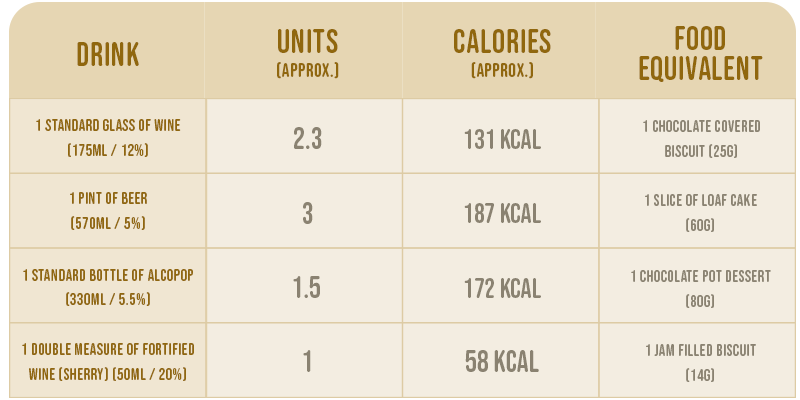
According to the NHS, cutting down can have immediate effects, including:
- feeling better in the morning
- being less tired during the day
- better looking skin
- feeling more energetic
- better weight management
You can also expect long-term benefits such as improvement in mood, quality of sleep and behaviour. It will also help your heart, and since regular drinking can affect your body’s ability to fight infection, cutting down can help get your immune system fighting fit again.

[18] https://www.nhs.uk/oneyou/for-your-body/drink-less/how-many-calories-are-in-alcoholic-drinks/







